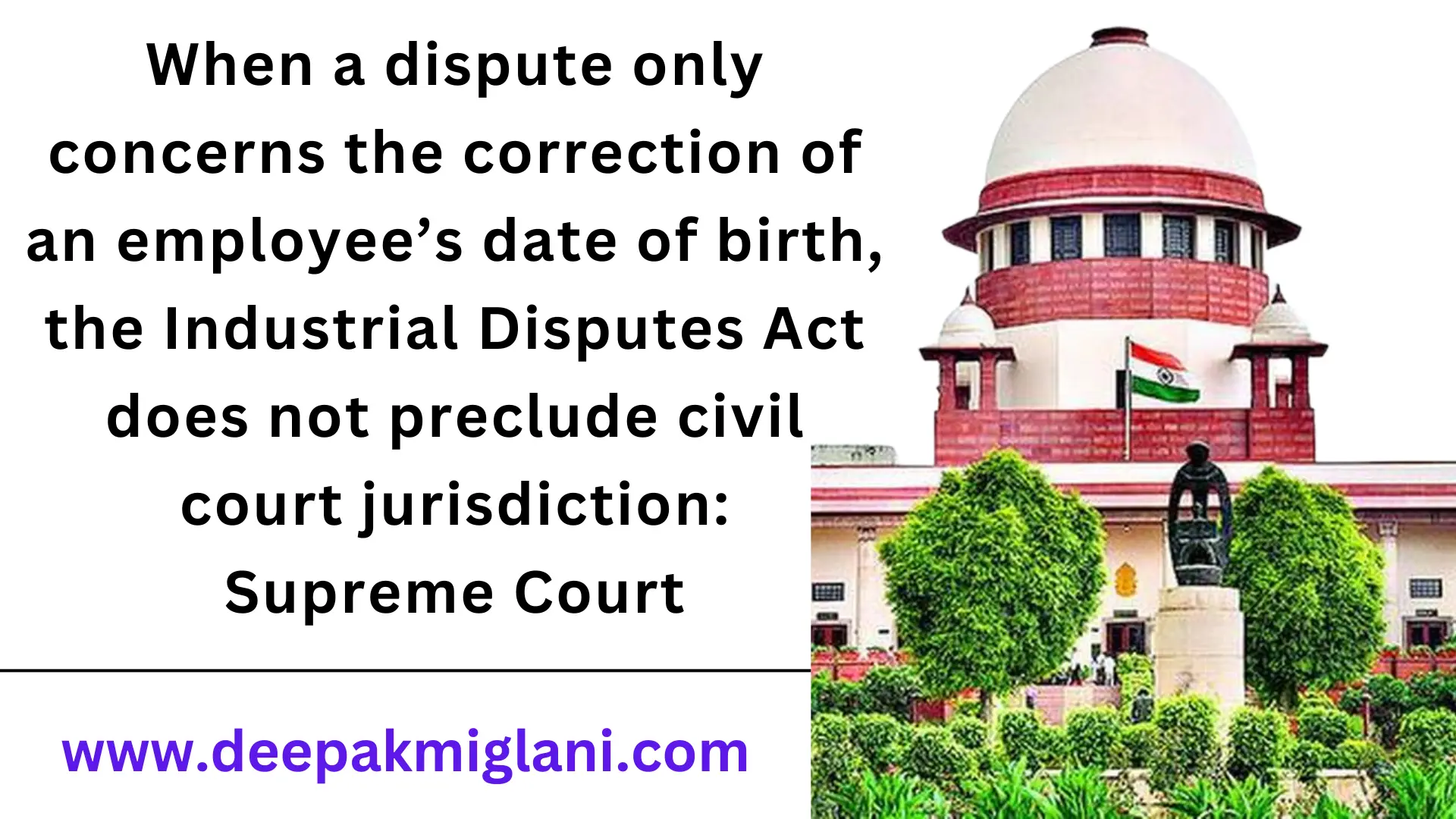The Industrial Disputes Act does not precludes civil court jurisdiction in a dispute relating to the correction of an employee’s date of birth.
The Supreme Court has held that the jurisdiction of the civil court in relation to the correction of date of birth of an employee is not ousted by the Industrial Disputes Act 1947. The Court stated that the jurisdiction of the civil court is ousted if it is a matter relating to the enforcement of a right under the Industrial Disputes Act.
The Bench was considering an appeal plea moved by an employee seeking to correction in his date of birth in the records of the company he worked in.The Trial Court had dismissed the suit as not maintainable. The High Court had agreed with the Trial Court’s view saying that the the appellant should have approached the labour court under Section 33-C (2) of the Industrial Disputes Act, 1947.
IN THE SUPREME COURT OF INDIA
CIVIL APPELLATE JURISDICTION
CIVIL APPEAL NO. OF 2022
(@ SLP(C) No. 8443 OF 2018)
TULSHI CHOUDHARY ………APPELLANT
VERSUS
M/S. STEEL AUTHORITY OF INDIA LIMITED (SAIL) & ORS. ………….RESPONDENTS
O R D E R
Leave granted.
During the course of hearing, it is accepted that, pursuant to the communication dated 07.08.1998 (Exhibit-8), appellant-Tulshi Choudhary had submitted an application dated 02.09.1998 (Exhibit-9) requesting for correction of his date of birth as 03.10.1949. The appellant had enclosed copy of the matriculation certificate (Exhibit-1) and the certificate issued by the Government of Bihar to the effect that the appellant had undergone training in the Industrial Training Institute (Exhibit-2), wherein again his date of birth has been mentioned as 03.10.1949. The respondent M/s. IISCO Limited, now amalgamated with the Steel Authority of India Ltd. (SAIL), had earlier issued the communication dated 07.08.1998 (Exhibit-8) pursuant to National Coal Wage Agreement III implementation instruction No.76. The communication dated 07.08.1998 had stated that the date of birth of the appellant, as recorded in their records, is 14.09.1947 and in case the date of birth as recorded with them is wrong, the appellant may apply for change within the period stipulated therein.
In spite of the representation/written communication by the appellant dated 02.09.1998 enclosing the required documents, the respondents did not communicate or make any change. In these circumstances, the appellant was compelled to file a civil suit on 06.12.2005, when he was still in service, the age of retirement being 60 years.
The trial court had dismissed the suit, but the first appellate court, on appreciation of the evidence on record, had decreed the suit. The High Court by the impugned judgment has dismissed the suit inter alia recording that the appellant should have approached the labour court under Section 33-C (2) of the Industrial Disputes Act, 1947.
We are not in agreement with this finding in view of the decision of this Court in The Premier Automobiles Ltd. v. Kamelekar Shantaram Wadke of Bombay & Ors. , (1976) 1 SCC 496, where the principles applicable to the jurisdiction of the civil court in relation to an industrial dispute were examined to conclude:
(1) If the dispute is not an industrial dispute, nor does it relate to enforcement of any other right under the Act, the remedy lies only in the civil court.
(2) If the dispute is an industrial dispute arising out of a right or liability under the general or common law and not under the Industrial Disputes Act, 1947, the jurisdiction of the civil court is alternative, leaving it to the election of the suitor concerned to choose his remedy for the relief which is competent to be granted in a particular remedy.
(3) If the industrial dispute relates to the enforcement of a right or an obligation created under the Industrial Disputes Act, 1947, then the only remedy available to the suitor is to get an adjudication under the Act.
(4) If the right which is sought to be enforced is a right created under the Industrial Disputes Act, 1947, such as Chapter VA, then the remedy for its enforcement is either Section 33-C or the raising of an industrial dispute, as the case may be.
In our opinion, the present case is not covered by principles (3) and (4) as the issue involved relates only to the correction of the date of birth. Jurisdiction of the civil court is not ousted, as this is not a case relating to enforcement of a right or an obligation under the Industrial Disputes Act, 1947. Equally, on merits, we find that the appellant is entitled to relief as claimed. The respondents have not been just and fair.
Accordingly, we hold that the suit filed by the appellant should be decreed. However, as the appellant had retired, we pass the decree in the following terms:
(i) The appellant would be entitled to back wages from 01.10.2007 to 31.10.2009, that is, the actual wages payable to the appellant, as if he had worked during this period. The respondents would be entitled to deduct from the amount, the pension amount, if any paid by them, or paid by the third party in terms of the agreement between the respondents and the third party.
(ii) The appellant would be entitled to interest on the amount payable in terms of clause (i) above at the rate of 7% per annum from 01.11.2009 till the payment is made.
(iii) The appellant would be also entitled to cost, which are quantified at Rs. 50,000/-.
The impugned judgment is set aside and the appeal is allowed in the aforesaid terms.
Pending application(s) stands disposed of.
. . . . . . . . . . . . . J. (SANJIV KHANNA)
. . . . . . . . . . . . . J. (BELA M. TRIVEDI)
NEW DELHI;
AUGUST 03, 2022.
